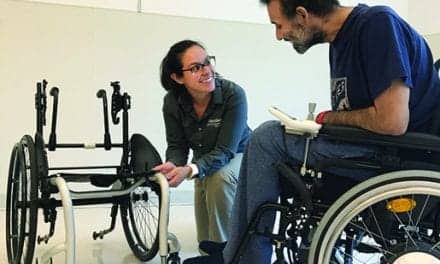A historic bipartisan bill has been introduced in the Senate that would require health insurance companies to provide meaningful coverage for prosthetic care.
The bill, S 3517 the Prosthetics Parity Act of 2008, is co-sponsored by Senators Olympia Snowe (R-ME), Tom Harkin (D-IA), Daniel Inouye (D-HI), Russell Feingold (D-WI) and is supported by the Amputee Coalition of America, Knoxville, Tenn. The legislation aims to ensure amputees covered by employer-paid health insurance are able to access the prosthetic care they need to lead full, independent lives.
The Prosthetic Parity Act of 2008 introduced in the House of Representatives also netted bipartisan support. It was authored by Representative Rob Andrews (D-NJ 1st CD), and Representatives George Miller (D-CA 7th CD), Todd Platts (R-PA 19th CD), Mario Diaz-Balart (R-FL 25th CD), and Lincoln Diaz-Balart (R-FL 21st CD), signed on as original co-sponsors. The number of House sponsors has more than quadrupled with strong and growing support on both sides of the aisle.
The bills require insurance companies to cover prosthetic care as they do all essential medical care, hence the phrase “prosthetic parity.”
“The legislation which we are introducing today—the Prosthetics Parity Act of 2008—will ensure that group health plans treat coverage of such prosthetic devices on par with other essential medical care covered by health insurance," said Snowe. "It does not mandate coverage, but it does assure than when it is offered, it is not so restricted or capped that it does not assure an amputee of the prosthetic they require.”
Kendra Calhoun, president and CEO of the Amputee Coalition, observed "Our Senators and Representatives are increasingly aware of the extent to which health insurers deny their enrollees meaningful coverage for prosthetic care, thus denying them the artificial limbs they need to live full lives. Not only will this legislation save money in the public and private sectors, but it will cover the many people who have never thought to ask if their insurance adequately covers limb loss.”
Calhoun says many health insurance companies cap prosthetic care benefits too low for the average person to obtain a prosthesis, and they often impose lifetime caps or eliminate coverage completely. Some insurance companies provide coverage for only one prosthesis per lifetime. On average, an adult amputee will need a replacement every 5 years, and children even more frequently as they grow.
The Coalition has collected and analyzed data demonstrating that health insurance parity laws would have a minimal cost impact—only about 25 cents more per month on insurance premiums.
“Parity legislation would save the federal government and taxpayers money by preventing cost shifting for prosthetic care from the health insurance companies to government programs such as Medicare and Medicaid,” she said. "The proposed legislation … will put prosthetic devices where they belong—on par with other essential medical care covered by health insurance."
There areearly two million individuals living with limb differences or loss in the United States. On average, each year 155,000 people in the United States lose a limb.
Snowe says the impact of severely-restricted prosthetic coverage can be devastating. “This is even more so for the estimated 70,000 amputees under the age of 18," she says. "Sadly, we see those children particularly affected as their growth increases the frequency with which a prosthetic requires replacement."
The importance of meaningful insurance coverage for amputees is also the focus of legislation at the state level. Eleven states have enacted prosthetic parity laws, and legislation is being advanced in more than 30 states, Calhoun says.




